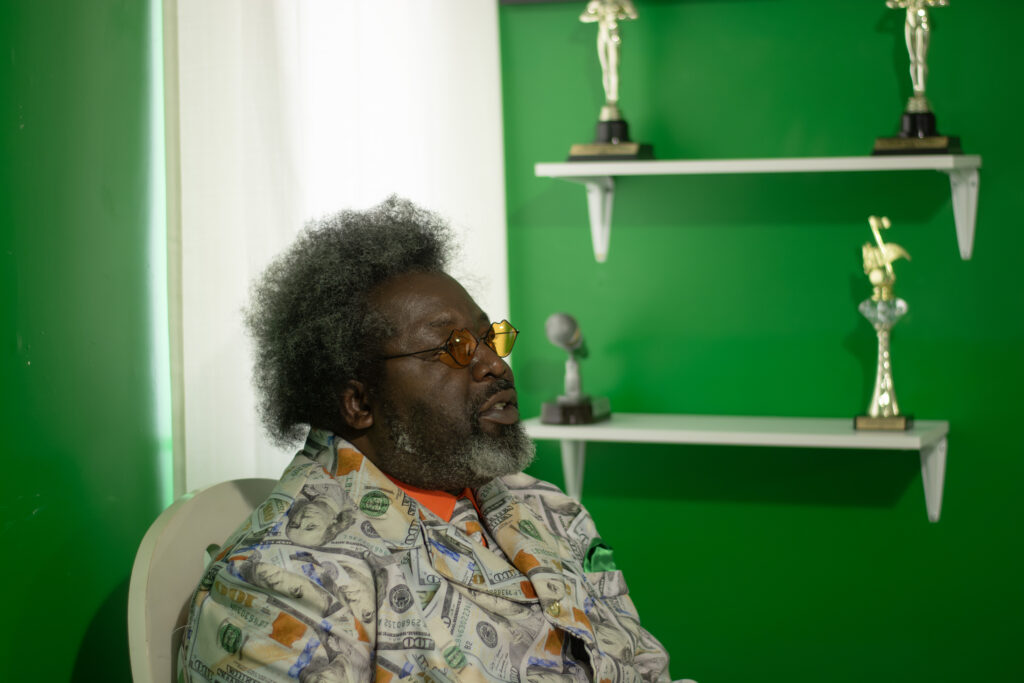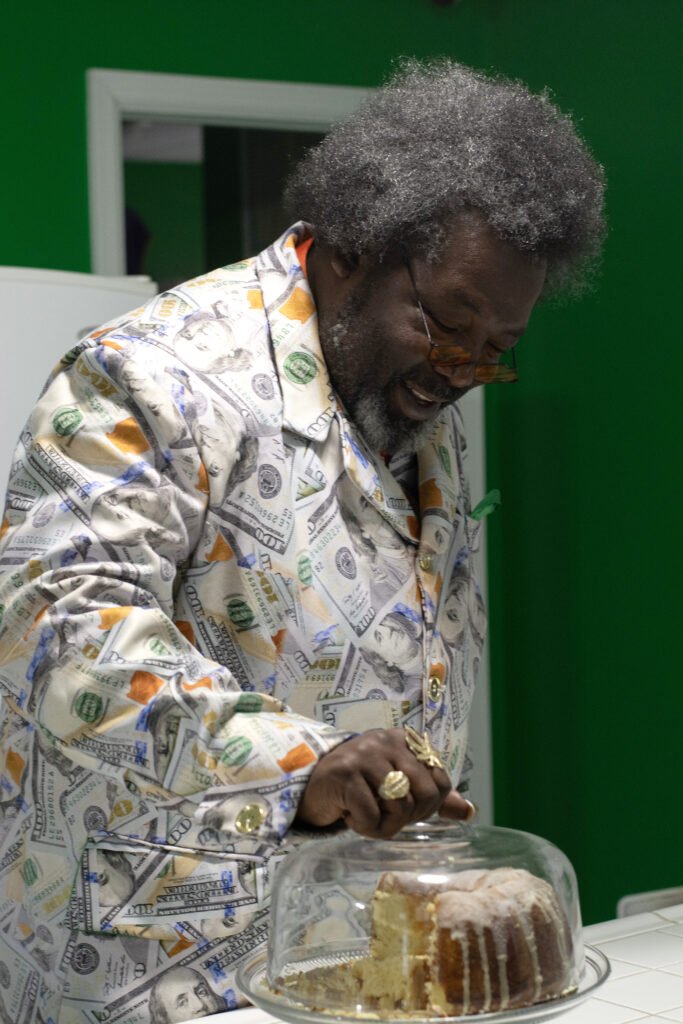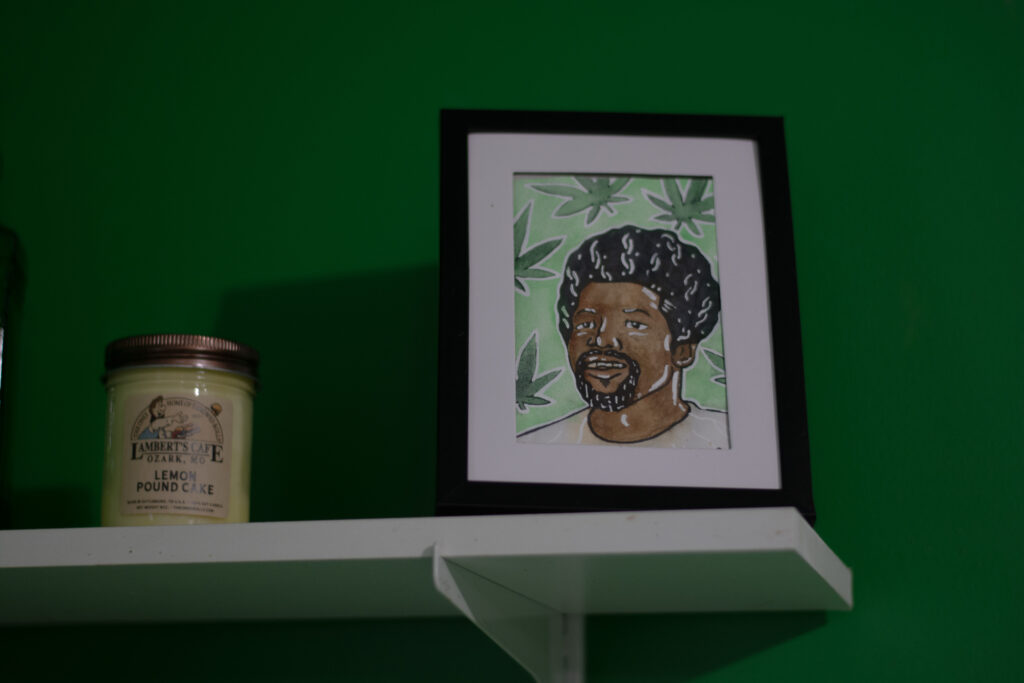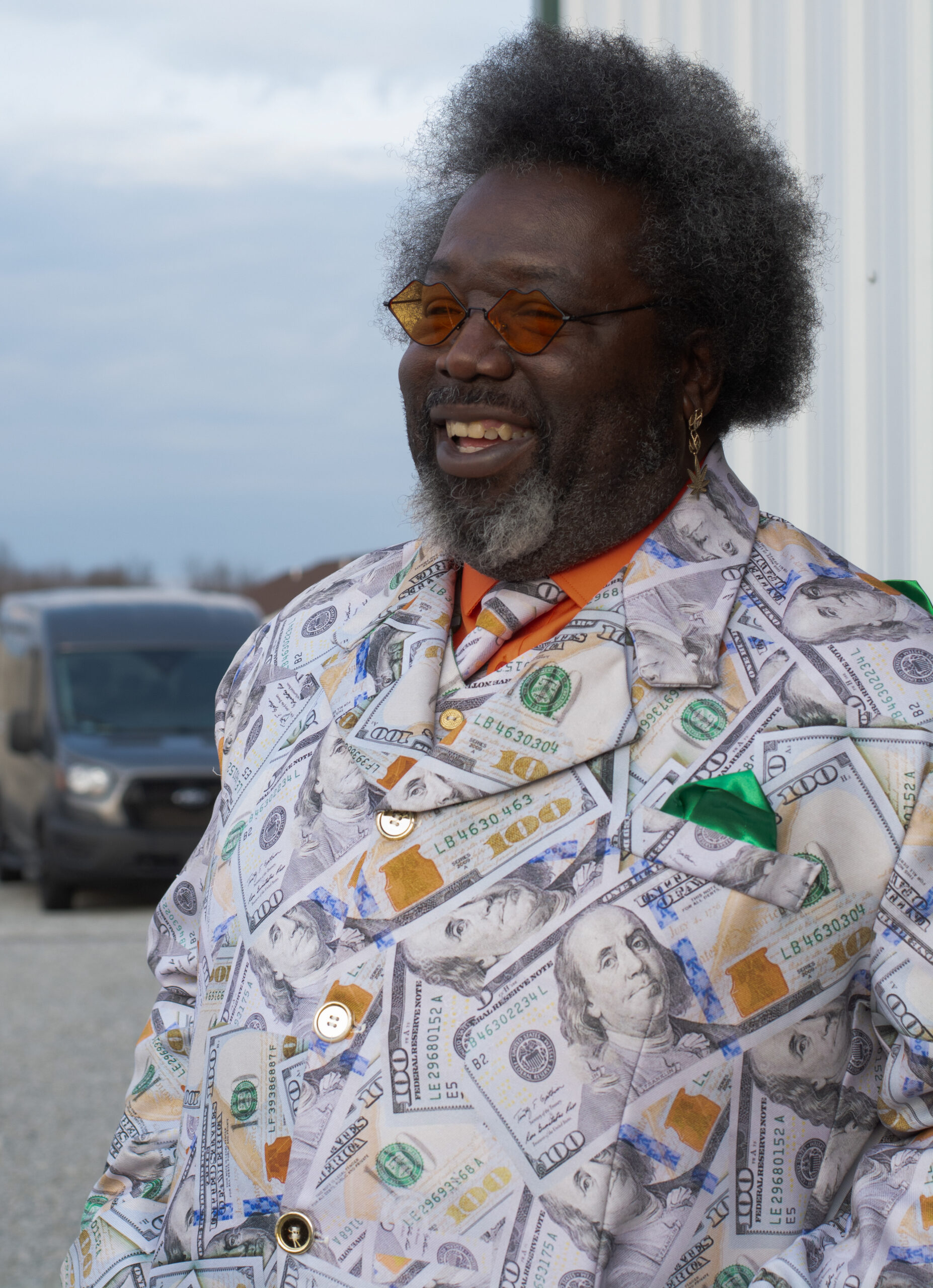Written by Hannah Campbell, Photos by Ashley Beach
Adams County’s great entertainer talks fame, fortune and front doors.
Unlike many rap artists, Joseph Foreman, better known as Grammy-nominated artist Afroman, prefers a laid-back lifestyle rather than the hustle and bustle of a major city, such as L.A.
He wanted somewhere where he could work, worship and live unbothered. He says he found this balance in the early 2000s, when he and his then girlfriend bought land from her brother in Winchester, Ohio.
He says the transition from his previous fast-paced life was not difficult, and he still enjoys the comparatively chill environment that surrounds him in Ohio.
“It’s peaceful,” he says. “You can always go to the party, but you can’t always get away from it.”

The peaceful space has given Foreman time to explore his musical interests and personal hobbies. When he’s not writing new tracks, Foreman tends to his rainbow of low-riders. He has multiple Cadillacs and a Chevrolet Chevelle tucked away among concert memorabilia in his garage. His favorite ride is a leafy-colored 1983 Coupe De Ville, adequately named Chronic Green.

Even though he lives outside the nucleus of the music industry, Foreman still flourishes as an artist. Since moving to Ohio, he has released several studio albums, 13 mixtapes and four extended plays.
But to understand Foreman’s wild productivity and ascent to well-known moniker, one should understand his backstory. His successes often came from sadness.
Story of Musical Success
The lyricism behind his Grammy-nominated hit “Because I Got High” camouflages heartache with cheeky lines about retaking classes, losing a car and more due to marijuana usage.

The song is infectiously catchy, and although success was his goal, he says the reality sometimes pinches his heart.
“Everybody’s laughing at it, but those were my heartaches,” he says. “It wasn’t funny before I wrote it.”
At the time of the song’s release in 2001, Foreman told The Washington Post that he’d made the song in his garage, and he didn’t think anyone beside his friends would listen to the song. In just three weeks on the charts, the song moved from No. 67 to No. 13 on the Billboard Top 100.
The song has recently resurged on social media, gaining Afroman online traction over a decade after its release. Foreman’s affinity for marijuana has inspired his persona from the beginning, so much so that in a 2001 interview with Time magazine about the success of “Because I Got High,” he felt the need to defend his hazy pastime.
“You know what, dude? I made this tape for all my homeboys. I didn’t think I’d be talking to TIME magazine,” Foreman says. “I’m a little worried about Rush Limbaugh and Newt Gingrich. I don’t want to get anybody riled up. I just figured, since I’m a pothead, why can’t me and the other potheads have a little joke between ourselves.”
While building his style, the rapper wanted to blend Rakim’s lyrical sharpness with the 2 Live Crew’s playfulness. To Foreman, a rapper can be anyone but that’s not the case for a storyteller. He believes that storytelling is something that can set an artist apart from the crowd.
“They always took you on a journey even if the story wasn’t good. There was some kind of joy of going through them,” he says.

Those stories are what he keeps in mind while writing his rhymes; however, it all becomes null unless the lyrics can make him chuckle. Foreman realized early in his career that a little joke could take a rhyme over the top.
“Rap music used to be fun,” he says. “It was instant fun. You can snap into it like a bag of chips.”
Coping through Comedy
As much as Foreman relies on comedy to cope with his day-to-day life, the reality of his current situation isn’t something he takes lightly. Foreman is in the middle of a lawsuit with the Adams County Sheriff’s Office (ACSO) due to three songs he released in late 2022 and the event that inspired them.
The trio of tracks — “Will You Help Me Repair My Door,” “Why You Disconnecting My Video Camera” and “Lemon Pound Cake” — take a comedic spin on the Office deputies searching Foreman’s kitchen, closet, bedroom and garage on Aug. 21, 2022.
Office deputies knocked down his kitchen door and nearly took a slice of the cake while executing a search warrant on suspicion of kidnapping and drug trafficking, all of which was caught on a home surveillance system.

“People was tripping on how horrific and traumatizing it was (and) at the same time laughing,” Afroman says. “What I like about it is I inspire the human to hesitate and make the best out of a bad situation.”
That morning, Foreman woke up around 6 a.m. in his hotel room and said the Lord’s Prayer as he usually does to jumpstart his day. He was excited to get back to his own bed and his beloved cars after a month on the road. After a few minutes of shuffling around his room, Foreman realized he wasn’t quite ready for the 5 ½ hour drive.
He went back to bed for a few hours.
After being on the road, he decided to stop for a pick-me-up: a large Carribean Way from Smoothie King. He says icy strawberry, banana and papaya treat proved to be his savior in more ways than one.
He believes God protected him from being home at the time of the raid. He says had he not stopped for a smoothie, he most likely would have been home when the police arrived.
He says he has always been upfront about his relationship with God. In an hour-long YouTube video published in 2023, he detailed his experiences as a Christian and how he has handled obstacles throughout his life.
“I really think because of my prayers and my close relationship with (him),” he says. “He led me not into temptation, but He delivered me from evil.”
Smoothie in hand, Foreman was still 65 miles from his white farmhouse. There wasn’t anything he could do besides wait, pray and watch the raid via the surveillance system in his home. This time, he intentionally stopped.
“In real time I’m sitting there on my phone watching this sweeping around my house and everything,” Foreman says.
Chills crept up and down Foreman’s body while he watched the events unfold. He wasn’t sure why the deputies were in his home, but he was glad he witnessed it through a screen — rather than in person.
“I’m glad I missed the confrontation,” he says. “That’s the one thing that makes me twitch in my sleep. The confrontation, the misreading of the body language.”
In the weeks following the raid, Foreman spliced and diced the video footage and wrote accompanying lyrics poking fun at the search. The resulting music videos and branded merchandise used images of the officers’ faces. That move was one step too far for the seven officers who sued Foreman in March.
Deputies claim they have “suffered humiliation, ridicule, mental distress, embarrassment and loss of reputation.” The lawsuit also claims all the officers have received death threats.
“(The lawsuit) was a surprise, but also a compliment,” Foreman says. “Don’t mess with me.”
Foreman countersued the Office for “defamation of character, stealing [his] money, tampering with evidence destroying [his] video cameras and vandalism.”
The Path Forward
Yet, Foreman hopes to forgive and move forward in time.
“I’m not the best Christian in the world,” he says. “(But) at the end of the day, those are my brothers in Christ.”
Foreman recently extended his platform into advocacy by announcing his candidacy for the 2024 U.S. Presidential election. He cites law enforcement corruption and the legalization of marijuana as key issues of his campaign.
“I’m all about people becoming a better person,” he says. “I have no problem with them being wherever they are right now but progressing. That’s all I really ask from any human being.”

Today, it’s been almost two years since the raid, and now as Foreman sits in his kitchen, he says he tries not to dwell on the incident. He prefers to think about the fruitful aspects of his life, like his family, his cars, his career and his faith.
All he needs now is someone to pay for his door.
Related posts
What’s Inside
- Behind the Bite (68)
- Features (124)
- In Your Neighborhood (102)
- Photo Essay (4)
- Read the Full Issue (8)
- Talking Points (48)
- The Scene (15)
- Uncategorized (3)
- Web Exclusive (5)
- What's Your Story? (21)


Find us on Social Media